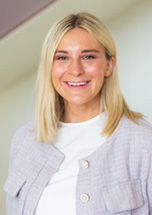
When you think of a traditional MBA student, what image comes to mind? Do you imagine someone who’s already exhibited great business acumen in their profession? A leader with experience in industries such as finance or real estate? An individual with a Type A personality and an eye for detail? Of course, these images do paint a picture of a “traditional” MBA student or degree holder, but as we know (specifically in the post-COVID world), traditional ideas around education and the workplace have shifted dramatically.
Graduate school has been a dream of mine as long as I can remember. At a young age, I decided if I went to college, I’d also get a master's degree at some point - and maybe even a PhD, too. When I started applying for graduate programs, I was hesitant and unsure which programs I should apply for. Although I knew an MBA was my master’s degree of choice, I didn’t really know if I was qualified.
As an undergraduate, I pursued a degree in political science. Long story short, this led me to a short career in Washington, D.C.: not the typical picture of an MBA candidate. Although I was only there a short time, I was able to move up quickly and get experience as a team manager in the United States Senate, in a consulting role, and managing portfolios. My work there was meaningful and created strong bonds and relationships with people who were trying to make important changes that affect us all. While working in Washington, my responsibilities could vary day to day from developing business strategy with clients, analyzing legislative or rule-making language, running tables or data analysis to predict results of a potential business decision, and working directly with members of Congress and their staff. I cultivated the ability to rely on data, a knowledge of how best to interact with high level government and private-sector stakeholders, excellent presentation and public speaking skills and best practices in addressing industry-wide concerns and strategy gaps. That being said, going into the application process my skillset was wide and as extensive as those with a traditional business background.
Although my personal background may seem out of place in this piece, I point it out to note that although my background wasn’t in business, I possessed skills that are vital in the success of any MBA student: the ability to build strong client relationships, experience with data creation and interpretation, and client/business strategy development, just to name a few.
Because of my admittedly non-traditional experience, when I started my graduate school search and application process, I nearly ruled out programs. My time in D.C. was a good way for me to get an idea of whether or not I wanted to work in the field of politics or political consulting roles that I had gained experience in. After a few years, I decided this wasn’t the path for me: I now knew I wanted to pursue a career path in consulting. Once I started the process of applying to school, I decided that I’d apply mostly for MBA programs despite my hesitations.
Now that I’ve been in the Walton MBA Program for over a year, I realize the importance of trusting my gut instincts and reaching for a goal I didn’t know if I was qualified for. The truth is, I was qualified all along.
Personal Mindset Shift
My professional experience may not have been traditional, but I realized many MBA programs were interested in the skills I had: working with data, crafting excellent people and presentation skills, and client relations. I used these skills quite literally every single day in the positions I held. In many ways, graduate programs are a training ground. If you exhibit certain characteristics and skillsets, if you work hard, if you have a proven track record of being a successful professional, you’re qualified for these programs. That said, business school will train you on Excel, data visualization, and data analytics, so don’t let a gap in these areas discourage you from pursuing an MBA.
On the other side of that, certain skills such as working with people, developing corporate strategy, and presenting in front of important clients largely come from years of experience in the workforce, although there is some exposure to this in MBA programs. Of course, this is oversimplified but my point is this: don’t restrict yourself. MBAs are no longer for small groups of people in a narrow set of industries. Despite your background, your skills are valuable, and employers know that.
Over the past 5-10 years there’s been a slow shift in higher education: specifically, who pursues what degrees. MBAs fall into this category of shifting demographics. Traditionally, those who worked in industries such as accounting and finance made up the majority of the applicant pool to MBA programs. “Outsiders” in industries like healthcare and government were traditionally discouraged from applying to business schools. In fact, it was almost unheard of at some point to see someone from “outside” fields in one of these programs. Now, MBA programs are full of a more diverse group of professionals from a variety of industry backgrounds. In fact, some programs no longer even require formal work experience for acceptance to their programs!
The “new” MBA requires individuals. Graduate programs have recently been welcoming the idea that groups of different individuals with unique professional and personal backgrounds not only enrich the experience, but also enhance the workplace. Most workplaces are indeed filled with people from different areas of the country, with different career paths, and different approaches to a variety of problems. The current MBA cohort at the University of Arkansas often reflects this to the great benefit of the students as well as their future employers. These programs teach very important technical skills, but they also teach “real world” interpersonal ones such as negotiating, working with new teams, and even balancing busy schedules!
Moving Forward
If you’re reading this as a prospective MBA applicant: I encourage you to challenge your assumptions about MBA programs and the value of the degree. Not sure if you have the hard skills to get into a program? Worried about your non-traditional experience? Graduate schools have admissions panels for a reason! The professionals vetting the applicants are experts. They understand who make the best candidates for their programs and why. Don’t let your assumptions about what these programs are or aren’t stop you. A quick caveat: do your research, meet with recruiters for programs you’re interested in, and attend info sessions. This is a good way to get the information you need without letting something that may or may not be true hold you back.
If you're reading this as a current MBA student: Think about your future in a similar way: your MBA has helped you develop invaluable skills that are useful in any position you’ll have moving forward, and employers know that. Of course, if you’re interested in pursuing a traditional business path, that’s an excellent choice! But, if you’re unsure and want to follow a non-traditional path after graduate school, remember that you can apply your skills to any field you’re interested in. The skills you gained in your program will most certainly translate across industries.
If you’re reading this as an employer: The number one priority for an employer will always be to hire individuals with desired skillsets that benefit the firm. My challenge is to not limit yourself to those with traditional experience. Instead, branch out and hire or work with professionals with a unique background can bring in unique skills that may very well balance and add great value to your team.
MBA cohorts include professionals and students of all backgrounds from various industries,
and they reflect the workplace more and more. MBA programs are continually reflecting
this at an increasing rate. This is a benefit to us all of us, from future students
to current students to employers

 Sydney Combs is currently an MBA candidate at the Sam M. Walton College of Business
with a concentration on data and information systems. Prior to graduate school, she
gained several years' experience working in the federal government and in the private
sector, where she consulted with various government clients. Extracurricular programs
she's involved in include her spot at the VP of the MBA Consulting Club, member of
P4, and active alumna of the philanthropic organization, The Madison of DC.
Sydney Combs is currently an MBA candidate at the Sam M. Walton College of Business
with a concentration on data and information systems. Prior to graduate school, she
gained several years' experience working in the federal government and in the private
sector, where she consulted with various government clients. Extracurricular programs
she's involved in include her spot at the VP of the MBA Consulting Club, member of
P4, and active alumna of the philanthropic organization, The Madison of DC.



